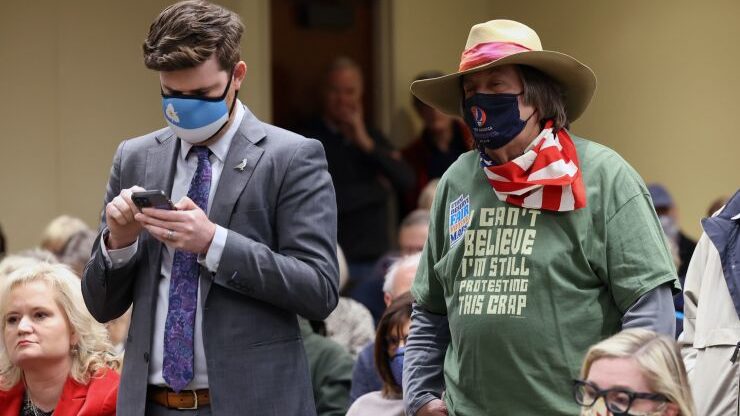Opponents of Utah’s redistricting maps respond after motion to dismiss
May 10, 2022, 4:03 PM | Updated: 4:10 pm

Jerry Schmidt, wearing a hat, American flag bandana and mask, stands in line to expresses his opinion on redistricting maps during a Legislative Redistricting Committee hearing at the Capitol in Salt Lake City on Monday, Nov. 8, 2021. Photo credit: Scott G Winterton, Deseret News
SALT LAKE CITY — The defendants in the lawsuit over Utah’s redistricting maps filed a motion to dismiss the lawsuit this week. The Utah State Legislature, Utah Legislative Redistricting Committee, and several individual elected officials named in the case argue, among other things, that the Utah Constitution places the authority and discretion for redistricting solely with the Utah Legislature.
The League of Women Voters, Mormon Women for Ethical Government and several named individuals filed the lawsuit to overturn Utah’s redistricting maps put in place by the Utah legislature.
“We expect this argument will be rejected here.”
Attorney for the plaintiffs, David Reymann, told KSL NewsRadio’s KSL at Night hosts that the motion didn’t surprise them.
“The State’s motion to dismiss is nothing surprising. It’s what we expected to see,” Reymann said.
And regarding the defendants’ argument that the state constitution places the authority and discretion for redistricting solely with the legislation, Reymann is skeptical.
“Their argument is that all these provisions in the constitution that speak to the right to vote, that speak to free and fair elections, have nothing to do with their potentially unfettered power to redistrict,” he said
“That argument has been rejected in multiple other states with constitutions very similar to Utah’s. We expect it will be rejected here.”
The redistricting fights going on in other states right now in various stages are “in some senses similar,” Reymann said, “in that they look to similar provisions in state constitutions to say there are limits to what the legislature can do, and when they *gerrymander districts in a way that means that certain people have substantially less voting power than other people, that violates the constitution.”
(*To gerrymander a voting district is to manipulate the boundaries of an electoral constituency so as to favor one party or class.)
The larger impact of this case
The KSL at Night host asked Reymann about the impact of this case, particularly on the future of initiatives and referendums in Utah.
“We’ve asked the court to strike down the legislature’s gerrymandered map and to either order new maps be drawn or to oversee that process.
“But we’ve also asked them to call foul on what the legislature did by ignoring and disregarding the will of the voters.”
Lawmakers can redraw U.S. House district boundaries every ten years as a result of population increases. The 2020 Census indicated that Utah’s population had increased by so much that the state was named the fastest-growing state in America between 2010 and 2020.
By 2021, Utah lawmakers had created a legislative redistricting committee made up of lawmakers. Passage of Utah Proposition 4 created the Utah Independent Redistricting Commission. It was made up of seven Democratic and Republican party leaders, and a chair chosen by the Utah governor.
Opponents to Utah’s redistricting maps question the map chosen by Utah lawmakers. They did not choose the map favored by the independent commission.
Opponents are particularly concerned about how Salt Lake County was divided. In some cases, neighborhoods are split between two different congressional districts.
“The fact that a significant majority of Utahns voted to not have the gerrymandered situation we’re dealing with right now is powerful evidence that the legislature has arrogated to itself power that should belong to the people,” Reymann said.
“This lawsuit is seeking to restore that balance.”
Related reading:
- Utah group considers lawsuit over congressional redistricting map
- Lawmakers are called upon to adopt ‘bipartisan’ redistricting maps
- Utah Independent Redistricting Commission gives final map to committee
- Utah Independent Redistricting Commission finalizes maps, pushes back on Rob Bishop claims
- Rob Bishop suddenly resigns from Utah Redistricting Commission













